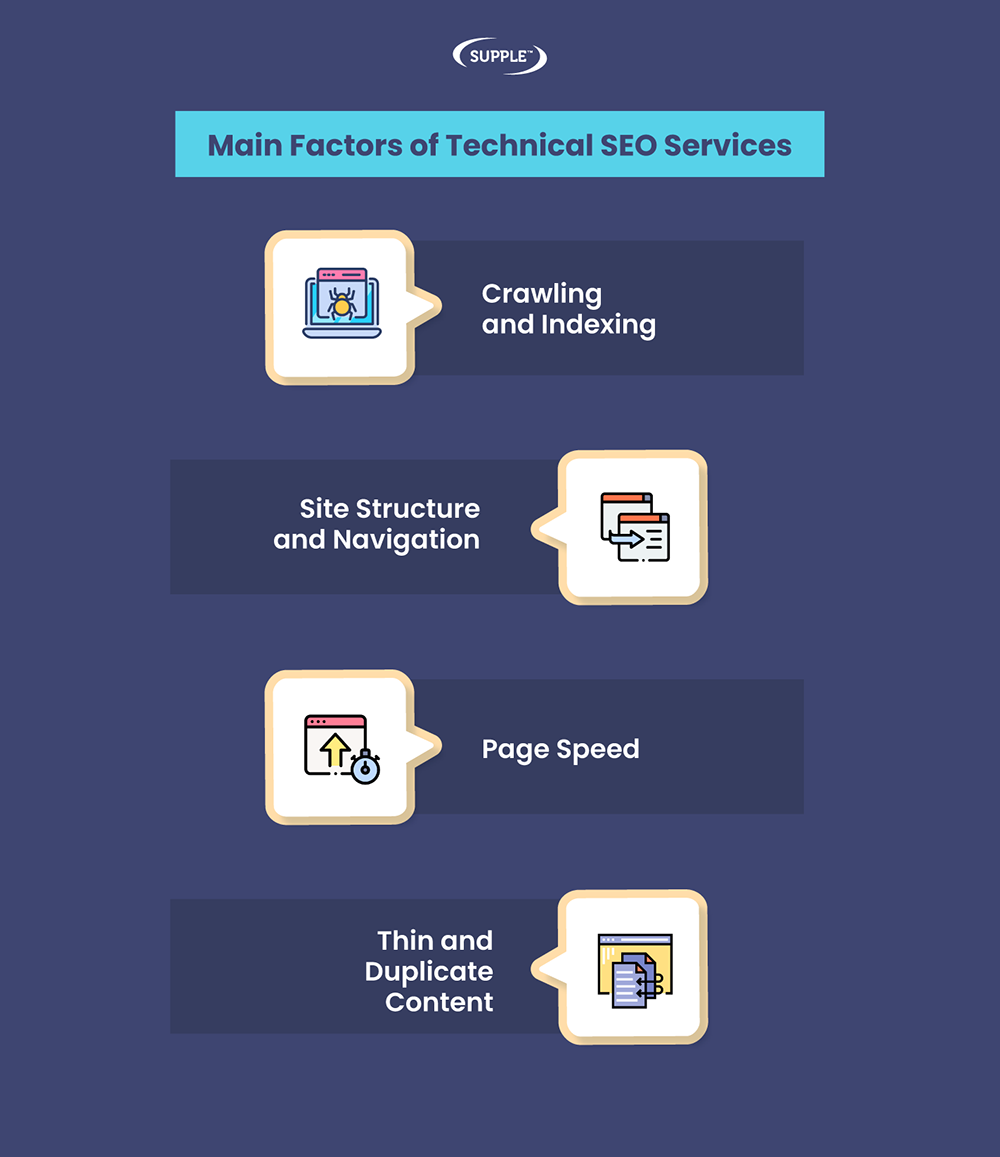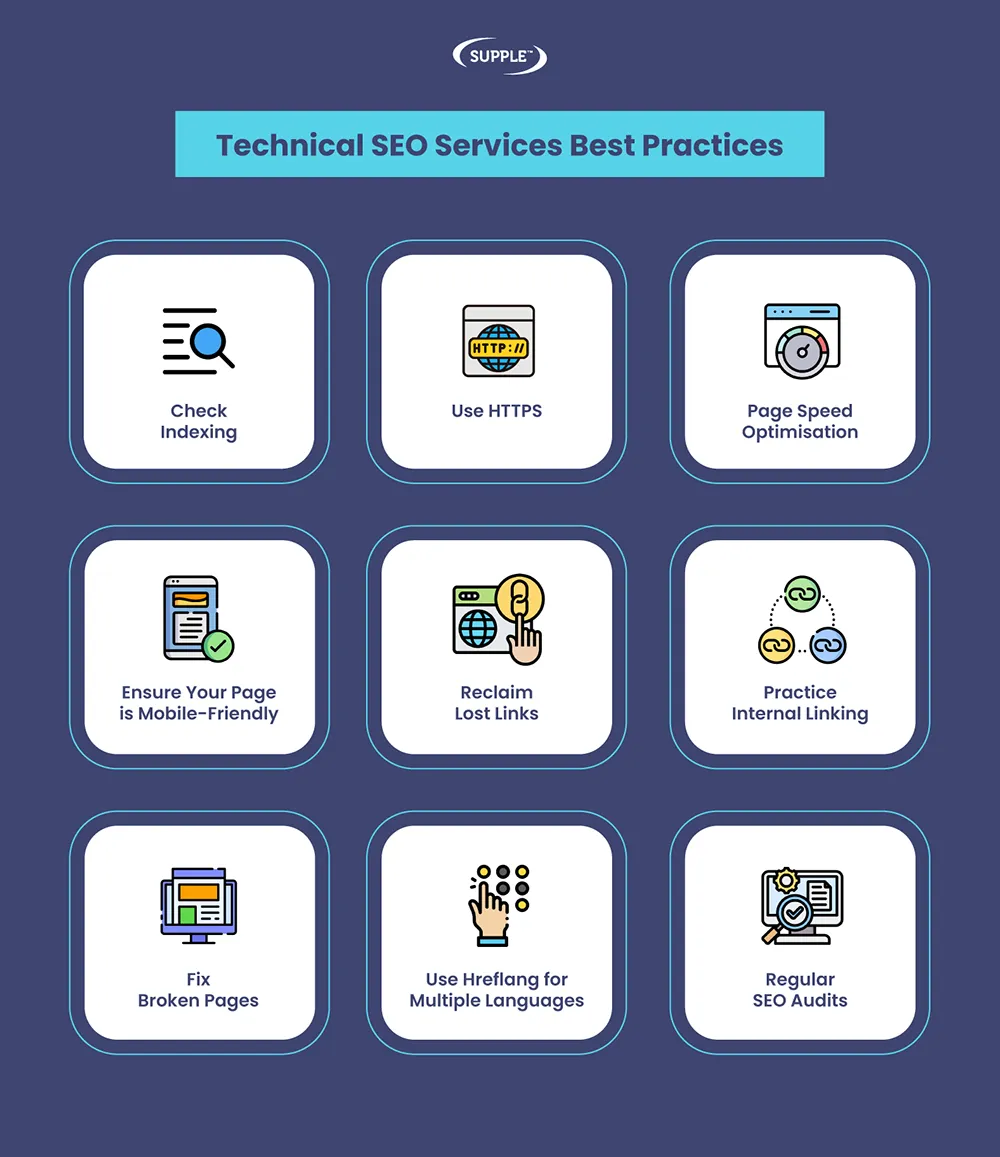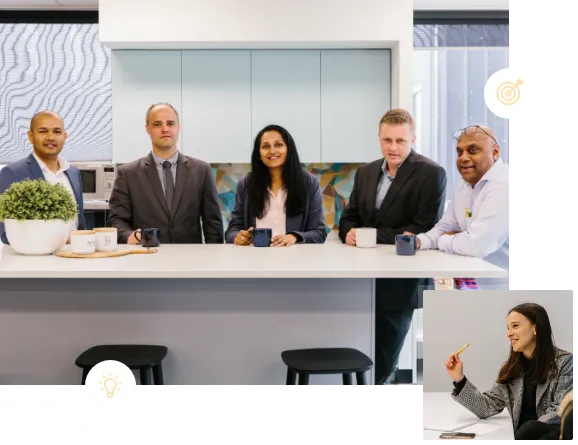
As the name suggests, technical SEO focuses on optimising a website for search engines from a technical perspective. This includes things like site structure, code optimisation, and server configuration. Technical SEO can be complex and time-consuming, but the results are proven and trusted by both Google and consumers. The Supple team can assist you with technical search engine optimisation as part of your broader SEO strategy.
Get the Essential SEO Insights You Need to Outrank Your Competitors – Free Audit Available!
Technical SEO
To ensure that your SEO strategy performs as planned, you first need to ace technical SEO.
Technical SEO services are those that lay the foundation of your website.
Think about it.
Even if you have amazing content in place and practice all the dos for building a successful link network, it wouldn’t bear any results if there are issues with your pages and technical barriers to ranking.
To identify what are technical SEO issues and how you can address them, you first need to know what technical SEO is.

OUR SEO PROCESS
The First Page of Google!
Research
In this phase, our SEO consultants will work with you to understand your business and define the goals of our SEO campaign. We will perform competitor research and search intent analysis before identifying the keywords that we think you should target.

Audit
Our comprehensive SEO audit looks at everything from content gap analysis and internal links to site architecture, backlink profiles, technical SEO, and crawl optimisation. Our team will identify all the growth opportunities based on your current website and SEO performance.
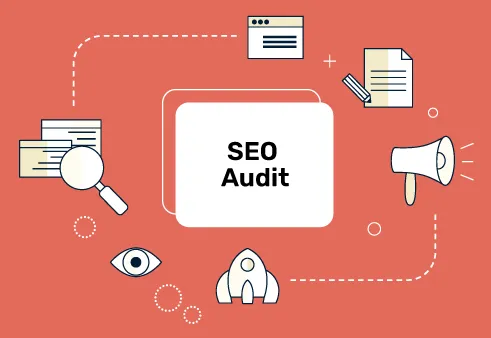
Strategy
In the strategy phase, we evaluate the findings from our audit and prioritise SEO tasks. We have an Impact / Effort / Action Priority Matrix that we follow to prioritise tasks. Our SEO specialists create an action plan for your SEO campaign, which includes a timeline with key milestones we have to achieve.
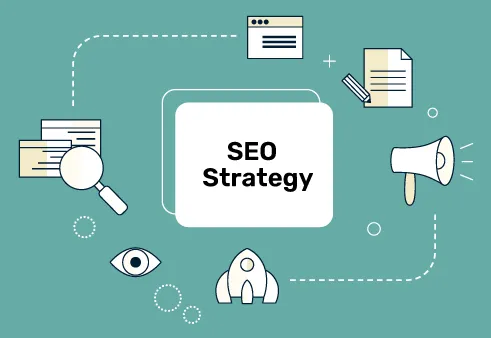
Implementation
Our SEO team, designers and developers work with you to start actioning the high priority tasks from the previous phase. Following this, we get onto the low priority tasks. This process allows us to knock out some early quick wins, then have a strategy in place to tackle the high effort tasks. We keep the low rewards tasks on the back burner and tackle them when we get time as the campaign progresses.
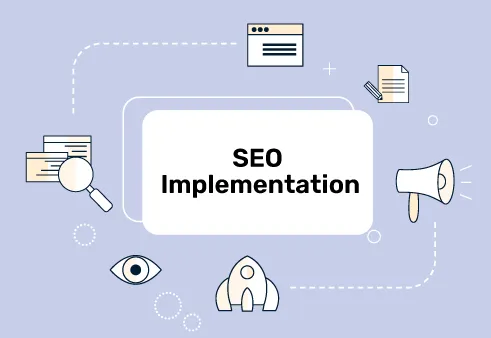
Reporting
We have systems and processes in place to make sure that we track and report on your SEO campaign.
As you can imagine, this is not the end. Our SEO consultants are constantly analysing and tweaking your campaign to achieve the best possible results on the 1st page of Google. It is an ongoing process, and we are with you for the long term!
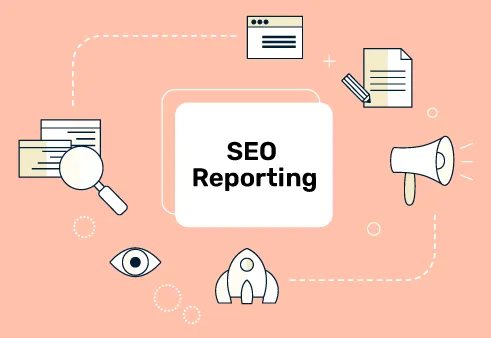
Research
In this phase, our SEO consultants will work with you to understand your business and define the goals of our SEO campaign. We will perform competitor research and search intent analysis before identifying the keywords that we think you should target.

Audit
Our comprehensive SEO audit looks at everything from content gap analysis and internal links to site architecture, backlink profiles, technical SEO, and crawl optimisation. Our team will identify all the growth opportunities based on your current website and SEO performance.

Strategy
In the strategy phase, we evaluate the findings from our audit and prioritise SEO tasks. We have an Impact / Effort / Action Priority Matrix that we follow to prioritise tasks. Our SEO specialists create an action plan for your SEO campaign, which includes a timeline with key milestones we have to achieve.

Implementation
Our SEO team, designers and developers work with you to start actioning the high priority tasks from the previous phase. Following this, we get onto the low priority tasks. This process allows us to knock out some early quick wins, then have a strategy in place to tackle the high effort tasks. We keep the low rewards tasks on the back burner and tackle them when we get time as the campaign progresses.

Reporting
We have systems and processes in place to make sure that we track and report on your SEO campaign.
As you can imagine, this is not the end. Our SEO consultants are constantly analysing and tweaking your campaign to achieve the best possible results on the 1st page of Google. It is an ongoing process, and we are with you for the long term!

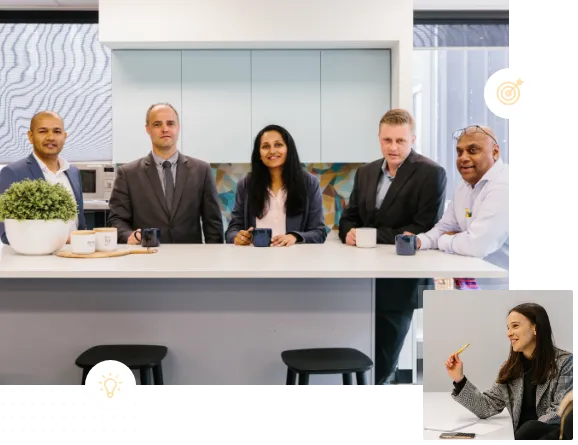
What are Technical SEO Services?
Technical SEO services are those aimed towards optimising the internal elements and backend aspects of a site to increase its search rankings. The goal of technical SEO services is to make web pages understandable and crawlable for search engines.
Technical SEO forms a part of on-page SEO that usually involves activities like submitting sitemaps to Google, creating SEO-friendly site structures, improving website speed, and finding error issues in the websites.
Case Studies
Return on Investment for business owners.
Main Factors of Technical SEO Services
1. Crawling and Indexing
Your site cannot appear on Google’s Search Engine Result Pagesif search bots cannot crawl your site. The first step towards implementing a technical SEO strategy is to ensure that your pages can be crawled and indexed by Google. It is how search engines gather content from the pages and use the links on them to find more pages.
You can identify your crawled pages from the coverage report on Google Search Console and check for any issues. The search engine bot tries to analyse and comprehend the content of the crawled pages. These pieces of content are stored in its search index. Your pages need to be crawled and indexed for them to appear in the search engine results. You can find out if the pages are indexed by performing a ‘site’ search. The easiest way to see if Google has indexed your page is through a URL inspection tool in Google Search Console.
2. Site Structure and Navigation
Site architecture is the way your site is structured and the pages are linked together. If your structure is easy to navigate, it helps GoogleBot to find your website content and helps it crawl easily. A sitemap is an XML file that contains all the critical pages on your site. It lets search engines figure out your site architecture. You can submit your sitemap through Google Search Console. Remember that your site structure impacts everything else you do to optimise your site. This is why, a strong structure makes every other technical SEO task easier.
Most of the crawling and indexing issues stem from improper site structure and navigation. What you can do is have a flat structure where there are few internal links between the web pages and you can reach the homepage easily. Improper site structure also leads to orphan pages and makes it difficult to fix indexing issues.
3. Page Speed
In the need for building a compelling and visually appealing website, brands usually ignore how adding different elements to the site can significantly slow down the speed. Page speed optimisation is one of the most crucial parts of SEO since it directly impacts your site ratings on desktop and mobile. You can use Google’s PageSpeed Insights to check your website’s speed. The higher your score in that, the better your site speed. The three most common ways of measuring page speed are:
Fully loaded page: This is the amount of time it takes for 100% of the page elements to load. It is one of the most direct ways to determine a page’s loading speed.
Time to First Byte: This method measures the time it takes to start the loading process.
First Contextual Paint: This measures the time it takes a page to load enough of its elements for a user to be able to start reading the content on that page.
4. Thin and Duplicate Content
Avoiding duplicate and thin content is harder than you think. Especially if most of your web pages overlap in terms of content because of similar services. It also becomes unavoidable if you’ve created multiple versions of the same page on different URLs. Duplicate content can surface on any site and it can gravely impact your overall site’s ranking.
So your job in terms of technical SEO is to find duplicate content and fix them. You can do so via SEO and content audit tools and by adding a ‘no index’ tag to the duplicate pages. Many eCommerce sites also use canonical URLs to let Google know that there’s a primary version of the page and others are just variations.
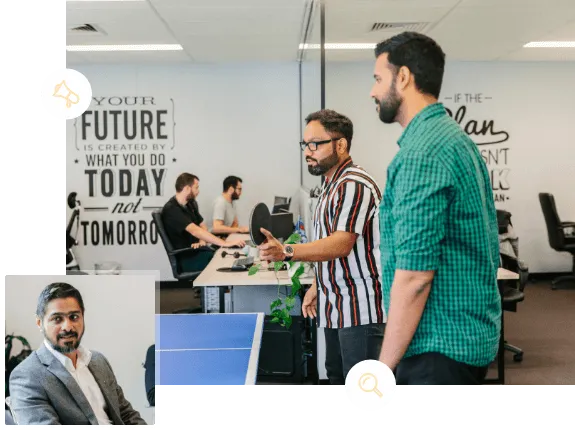
Client Testimonials
about Our Digital Marketing Services.
- 428 Google Reviews
- 4.9
Extremely reliable and super friendly staff. Jani and Sam helped us with our digital strategy. Would recommend to everyone who wants to get their SEO done.
Mark, Ron and Param from have been incredible to work with. From the very beginning, they took the time to understand our business goals and crafted a clear SEO strategy that is working really well.
Mark and Jani are fantastic to deal with and business has never been better
We are super impressed with this SEO team. They’re honest, transparent, and really know their stuff. They made everything easy to understand and were great to work with from the start. We saw our targeted keywords hit page one with half of them in the #1 spot, and organic traffic is up by nearly 20%. We recommend Supple for fast and high quality results.
I have to speak very highly of the crew of Supple Digital, Mark, Jani and Abbas do an amazing job of my website. Very highly professional and knowledgeable of their products and services. If you are in need of a good website go to these guys
View More Reviews

Technical SEO Services Best Practices
1. Check Indexing
Crawling and Indexing are the basics of technical SEO services. Every other SEO practice is fruitless if your pages aren’t even indexed by Google. You can check if you’ve indexed the page by using a site: operator or the overall indexation status. You can also check the status of your XML Sitemap Submissions in the Google Search Console.
If your pages aren’t getting indexed, it can be because Google isn’t able to crawl them or because it thinks your pages are irrelevant. Another major reason it can’t crawl is that you may have been slapped with a Google Penalty. Once you identify the reason, you can take steps to address the issues and facilitate Google to index your pages.
2. Use HTTPS
Google has emphasised the importance of security in its recent upgrades. To ensure your sensitive information like passwords and credit cards is protected, load your pages over HTTPS instead of HTTP. The former is a secure version of HTTP. HTTPS protects the communication between your browser and server from being hacked and tampered with by attackers. It provides authentication and confidentiality to most websites today. To check if your website is loaded by HTTPS, a website will show a ‘lock’ icon in the address bar.
3. Page Speed Optimisation
As we discussed before, page speed is an important factor when it comes to technical SEO. A slow-loaded page can increase the bounce rate and take a toll on your conversion rate. To avoid loading issues, it is advisable for brands to:
Reduce Web Page Size: Sure, compressing images and videos can work a great deal in improving your page speed. But they won’t alone make any difference, especially if your web page size is enormous. If page speed is your priority, you have to make a conscious decision to have minimum elements that facilitate faster loading.
Compress Media Files: Most of the loading issues arises because of the big media files. Compress them with image optimisation tools that will reduce the file size so that they take little time to load.
Use Content Distribution Network: CDN facilitates faster loading of pages regardless of how far the user is geographically from your server. CDN contents the visitors to the nearest server so there’s less distance for the files to travel.
4. Ensure Your Page is Mobile-Friendly
A true SEO specialist knows the importance of a mobile-optimised site. Google uses mobile-first indexing, meaning it indexes mobile versions of webpages separately. However, it’s not always that easy to keep the mobile-optimised issues at bay. There might be issues that arise specifically because your site isn’t mobile-friendly.
You want to ensure that your website is compatible with mobile devices and the way to do that is to head over to the ‘Mobile Usability’ report in Google Search Console. It will show you all the issues that you need to fix to build your page mobile-friendly.
5. Reclaim Lost Links
You spend so much time in building a strong linking profile for your website. But when websites change their URLs over the years, the old URLs that have links from high authority sites often get lost. One of the best technical SEO practices is to redirect those links to the current pages. This can considerably improve your link-building practices.
You can find the lost linking opportunities using SEO tools like Ahref’s Site Explorer. You can check the Best by Links report and filter links by “404 not found”. By redirecting the links to the current version, you’ll find plenty of new link-building opportunities and reclaim the lost value of the old links.
6. Practice Internal Linking
Speaking of link-building practices, internal link-building is too big of a strategy to ignore for technical SEO. Internal links are those that you add from one page to another on your site itself. It helps Google to add context to your pages and helps it rank them better. You can find internal linking opportunities using site audit tools. These tools identify the keywords that you’re already ranking for and suggest contextual internal link opportunities for your site.
While placing internal links, you need to ensure link placement is at the top of your page so that it helps with your bounce rate. At the same time, don’t use the anchor text for different pages as that can get confusing for Google. Read about the internal linking dos and don’ts before placing links on your website. Or you can simply hire an SEO agency that understands the internal linking protocols. Most SEO agencies offer technical SEO services for internal linking where they can identify linking opportunities for you, use keyword-rich anchor text, and help you add links to important pages.
7. Fix Broken Pages
A 404 error is always an unpleasant user experience. And if those pages have different types of backlinks, they all point to dead resources. This is why it’s critical to check for broken links on your site and fix them if you find any. On WordPress, you can fix broken links using the broken link checker plugin. It automates the checking process and scans your site for broken links every 72 hours. If it finds any, you’ll receive notifications via email so that you can take actions to fix them.
There are two primary actionable steps you can take to fix broken links. Firstly, you can reinstate the pages that were accidentally deleted or you can redirect your error pages with backlinks to other relevant pages. Once those links are fixed, you can update internal links that point to the newly deleted pages.
8. Use Hreflang for Multiple Languages
Sites that have a global audience usually opt for having websites in multiple languages. If you’re one of them, ensure that your site uses hreflang tags.
What are they?
Hreflang is an HTML feature that is used for specifying a webpage’s language and geographical targeting. It is how Google displays the language and geographic-specific versions of your pages to the visitors. You can implement this tag by adding hreflang tags in the <head> section of all versions of the page.
9. Regular SEO Audits
SEO audit is an ongoing activity. You need to run regular technical SEO audits if you want to consistently rank higher on search engine result pages. Running regular site audits gives you several action items to improve your SEO and lets you control issues before they escalate and harm your overall search rankings. There are several SEO tools available to run an SEO audit like Ahrefs, Semrush, etc.
There are a lot of things that go into running a complete SEO audit. To ensure you’re doing it right and consistently, it is advisable to hire an SEO agency that can perform these technical SEO services for you. They would know which are the best SEO practices according to your industry, and goals, how often your site needs SEO audits, and what new keywords you can bank according to the latest trends.
SEO Team Lead
company's online marketing goals.
- Bishal Shrestha
- Head of SEO (9+ Years Experience)
Bishal Shrestha is an innovative SEO leader and digital strategist with over 9 years of expertise in driving organic growth for businesses across diverse industries. Bishal combines technical proficiency with strategic vision, excelling in data-driven decision making and delivering measurable results. He specialises in technical SEO optimisation, advanced analytics, and scalable growth strategies.
Bishal brings a unique blend of software engineering background and marketing acumen to his role at Supple Digital. With certifications in Google AdWords and Google Analytics, he leads comprehensive SEO campaigns that consistently elevate brands in competitive digital landscapes. His holistic approach focuses on sustainable, long-term growth through innovative solutions.

Avail Technical SEO Services
Right from optimising your page speed to understanding the what and whys of crawling and indexing, technical SEO is all about understanding the backend of ranking on search engines. And yes, it can get complex and require expert intervention.
And while your hands are busy with creating the best content that users want to engage with and building marketing campaigns with high returns, you can trust Supple for your technical SEO services. Contact us to know more about our technical SEO services and how we can curate the perfect SEO audit plan for you.
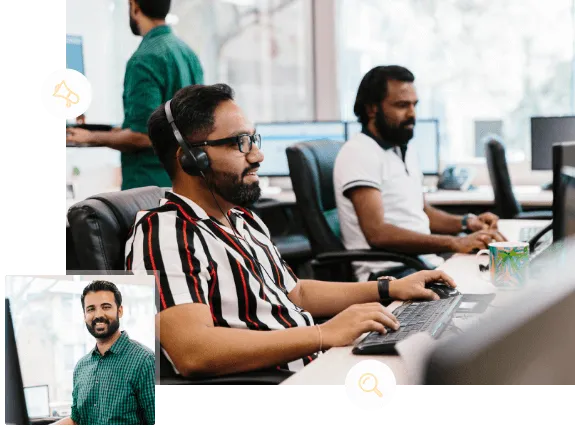
Popular Articles
Our Blog Is A One-Stop-Shop for Free Advice and
Comprehensive Guides
The Supple team publishes new articles, case studies, and guides all the time. Learn more about digital marketing with our experts.
Awards and Recognition
Industries We Work With
Businesses Just Like Yours.
- Accountants SEO
- Asbestos Removal SEO
- Blinds & Shutters SEO
- Cosmetic Physician SEO
- Doctors SEO
- Financial Services SEO
- Flooring Companies SEO
- Healthcare SEO
- Heating & Cooling (HVAC) SEO
- Hotel & Accommodation SEO
- Laser Clinic SEO
- Locksmith SEO
- Office Fitout SEO
- Optometrists SEO
- Real Estate SEO
- Security Companies SEO
- Windows & Doors SEO
- Mechanic SEO
- Electrician SEO
- Lawyers SEO
- Fashion SEO
- SAAS SEO
- Dentist SEO
- Plumber SEO
- Florist SEO
- Nonprofit SEO
- Solar Installers SEO
- Kitchen Renovation SEO
- NDIS SEO
- Removalists SEO
- We Work With all business get in touch
Platform We Work With
Your SEO Campaign
DIGITAL MARKETING FOR ALL OF AUSTRALIA
- SEO AgencyMelbourne
- SEO AgencySydney
- SEO AgencyBrisbane
- SEO AgencyAdelaide
- SEO AgencyPerth
- SEO AgencyCanberra
- SEO AgencyHobart
- SEO AgencyDarwin
- SEO AgencyGold Coast
- We work with all businesses across Australia
Our Online Marketing Tools
and help you achieve online success.
